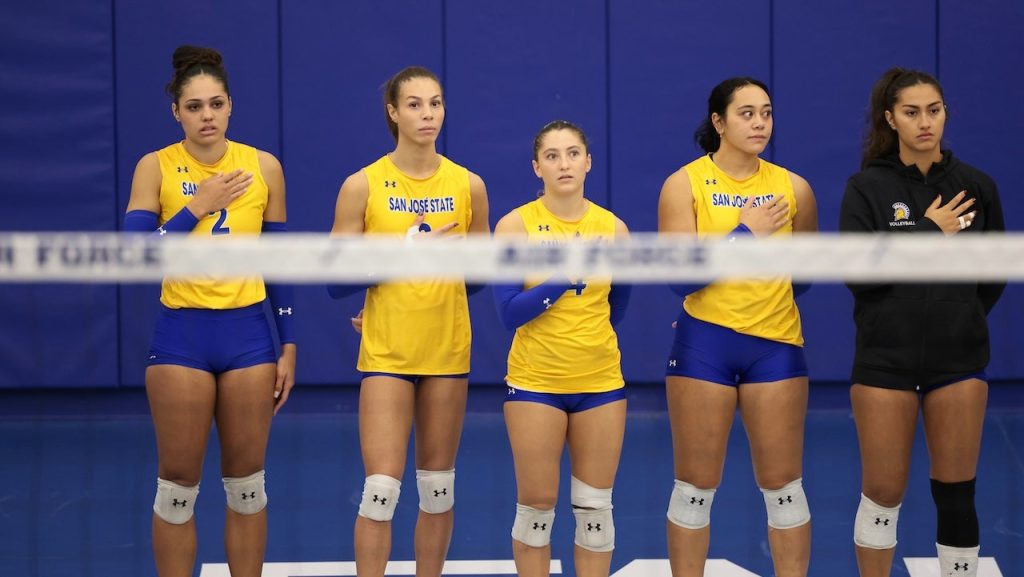The San Jose State University women’s volleyball team is facing a significant rebuild after a tumultuous 2024 season marked by controversy surrounding a transgender athlete, Blaire Fleming, culminating in a mass exodus of players through the transfer portal. Seven players, disillusioned by the season’s events and the perceived mishandling of the situation by the university and coaching staff, have opted to continue their athletic careers elsewhere. This exodus follows a season riddled with forfeited matches, heightened security measures, national media scrutiny, internal team conflicts, and even threats directed at one player. The team’s final game, a loss in the Mountain West Conference championship, effectively ended Fleming’s collegiate eligibility, but the repercussions of the season continue to ripple through the program.
The controversy stemmed from Fleming’s inclusion on the team, with several players raising concerns and filing lawsuits against the NCAA, the Mountain West Conference, and San Jose State University. Co-captain Brooke Slusser’s lawsuit against the NCAA alleged that the program withheld information about Fleming’s birth gender, forcing her and other players into uncomfortable shared spaces. A separate lawsuit, joined by former players Alyssa Sugai and Elle Patterson, claimed that Fleming was unfairly favored in scholarship decisions. This suit also included allegations of a plot orchestrated by Fleming to injure Slusser during a game, though an investigation failed to substantiate these claims. The escalating legal battles and public scrutiny added immense pressure to an already challenging season.
The situation further deteriorated with the suspension of assistant coach Melissa Batie-Smoose, who filed a Title IX complaint alleging favoritism towards Fleming and echoing the accusations regarding the plot against Slusser. Slusser revealed that Batie-Smoose’s dismissal deeply impacted team morale, as players felt they had lost a trusted confidante and advocate amidst the escalating tensions. This loss of trust extended to head coach Todd Kress, whom players felt was dismissive of their concerns and prioritized maintaining a facade of normalcy over addressing the underlying issues. The combination of legal battles, internal conflict, and perceived administrative inaction created a toxic environment that ultimately led to the players’ decision to seek new opportunities elsewhere.
The university, in a statement to Fox News Digital, expressed respect for the players’ decisions to transfer, acknowledging their autonomy in shaping their athletic careers. However, the statement offered little insight into the university’s handling of the situation or any plans to address the underlying issues that led to the team’s implosion. Coach Kress, reflecting on the season, acknowledged the extraordinary challenges faced by the team and staff, citing the difficulty of maintaining focus on the court amidst the external pressures and ensuring the safety and well-being of his players. His statement also pointed to the forfeitures by opposing teams as a catalyst for increased media attention and negative backlash directed at his team. He lamented the hateful messages directed at players and staff, emphasizing that the forfeited wins were not celebrated but rather met with apprehension for the ensuing controversy.
The controversy surrounding the San Jose State volleyball team extends beyond the immediate impact on the program, highlighting the broader debate surrounding transgender athletes in women’s sports. The case has become a focal point in the ongoing national discussion about fairness, inclusion, and the evolving landscape of competitive athletics. The legal challenges and public discourse surrounding Fleming’s participation raise complex questions about the balance between protecting the rights of transgender athletes and ensuring fair competition for all. The fallout from the San Jose State situation is likely to continue to influence policy decisions and shape the future of transgender inclusion in sports.
The impact of the controversy on the volleyball program is undeniable. The team faces a significant rebuilding process, losing a substantial portion of its roster and grappling with the reputational damage caused by the season’s events. The transfer of seven players necessitates a significant recruitment effort to fill the void and restore the team’s competitiveness. Beyond the immediate roster turnover, the program must also address the deeper issues of trust and communication that contributed to the team’s internal strife. Rebuilding a positive team culture and regaining the confidence of both players and the wider community will be crucial for the program’s future success. The long-term consequences of this turbulent season remain to be seen, but the San Jose State volleyball program faces a significant challenge in moving forward and reclaiming its place in the Mountain West Conference.

